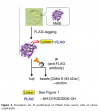The Function of NFAT Inhibitors in Immune Cells
In the complex network of the immune system, NFAT plays a crucial role. NFAT regulates the transcription of numerous cytokines, chemokines, and growth factors, thereby affecting various aspects of the immune response. In recent years, inhibitors targeting NFAT, particularly the VIVIT peptide, have become important tools for studying immune cell function and developing novel therapeutic strategies. As a global leader in high-performance life science products, Glpbio plays a pivotal role in the research and application in this field. This article will delve into the functions of NFAT inhibitors in immune cells and highlight Glpbio's innovative contributions in this area.
The Basics and Mechanism of NFAT Inhibitors
NFAT inhibitors, especially the VIVIT peptide, are cell-permeable peptides that can inhibit calcineurin-mediated NFAT dephosphorylation, thereby inhibiting NFAT nuclear translocation. This inhibition is selective and can last for 24 hours, significantly affecting NFAT function in immune cells. Long-term treatment with VIVIT can also significantly inhibit the levels of protease K, TRAP, and MMP-9 in the cytoplasm, further demonstrating its potential to regulate immune cell functions.
The Role of NFAT Inhibitors in Humoral Immunity
NFAT regulation of humoral immunity is complex and precise. It influences the function and differentiation of Th cells (such as Th1, Th2, and Th17 cells) and regulates B cell clonal selection and affinity maturation during germinal center (GC) reactions. During this process, the expression levels of NFAT2 and NFAT1 are significantly elevated, regulating B cell activation, antigen presentation, proliferation, and apoptosis.
Compared to B cells, the Ca2+/NFAT signaling in T cells is more crucial for humoral immunity. NFAT2 and NFAT1 jointly control the expression of cell surface receptors and cytokines, which are vital for Tfh cell differentiation, GC formation, and B cell affinity maturation. Using NFAT inhibitors, such as the VIVIT peptide, can effectively block these signaling pathways, providing powerful tools for studying the regulatory mechanisms of humoral immunity.
As a supplier of high-performance life science products, Glpbio offers various research reagents, including NFAT inhibitors. These NFAT inhibitor reagents have excellent purity, stability, and bioactivity, providing reliable support for scientists studying the role of NFAT in humoral immunity. By using Glpbio's products, researchers can gain deeper insights into NFAT regulatory mechanisms and explore its potential applications in immune-related disease treatments.
The Role of NFAT Inhibitors in Peripheral Immune Tolerance
NFAT inhibitors play an essential role not only in humoral immunity but also in peripheral immune tolerance. They regulate the differentiation and function of regulatory T cells (Treg) and regulatory B cells (Breg) that produce IL-10, which are crucial for maintaining immune homeostasis and preventing autoimmune responses.
In Treg cells, NFAT and Smad3 jointly bind to CNS1 to promote TCR and TGFβ-induced Foxp3 expression. In differentiated nTreg cells, NFAT binds to CNS2, which spatially interacts with its promoter, to maintain stable Foxp3 expression. Using NFAT inhibitors can effectively block these signaling pathways, providing new perspectives for studying Treg cell differentiation and function.
Glpbio's NFAT inhibitors offer powerful tools for researching the mechanisms of peripheral immune tolerance. By inhibiting NFAT activity, researchers can gain deeper insights into the differentiation processes of Treg and Breg cells and their specific roles in maintaining immune homeostasis. These studies not only help unveil the molecular mechanisms of immune tolerance but also may provide new strategies for treating autoimmune diseases and allogeneic immune responses.
NFAT Regulation of T Cell Anergy and Exhaustion: New Applications for NFAT Inhibitors
In the absence of sufficient co-stimulation, suboptimal stimulation, or chronic stimulation can induce anergy and exhaustion in CD4+ and CD8+ T cells. NFAT activation plays a crucial role in this process. By forming homodimers or complexes with other transcription factors, NFAT activates the expression of tolerance genes, leading to T cell anergy.
Using NFAT inhibitors can effectively block this process, providing new avenues for researching the mechanisms of T cell anergy and exhaustion. By inhibiting NFAT activity, researchers can explore ways to reverse T cell anergy, restore their immune function, and offer new strategies for treating chronic infections and tumors.
Glpbio's NFAT inhibitors play an essential role in research in this area. Their high-quality products offer reliable research tools for scientists, helping them gain deeper insights into the molecular mechanisms of T cell anergy and exhaustion, and explore new therapeutic strategies.
In summary, the functions of NFAT inhibitors in immune cells are multifaceted, involving various aspects of humoral immunity, peripheral immune tolerance, T cell anergy, and exhaustion. As a global leader in high-performance life science products, Glpbio provides research reagents, such as NFAT inhibitors, with excellent purity, stability, and bioactivity, offering reliable support for scientific research. By using Glpbio's products, researchers can gain deeper insights into NFAT regulatory mechanisms and explore its potential applications in immune-related disease treatments.












Kommentare